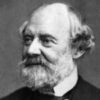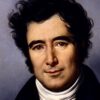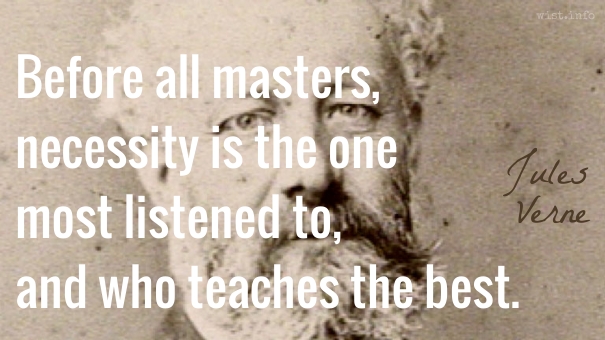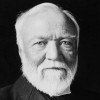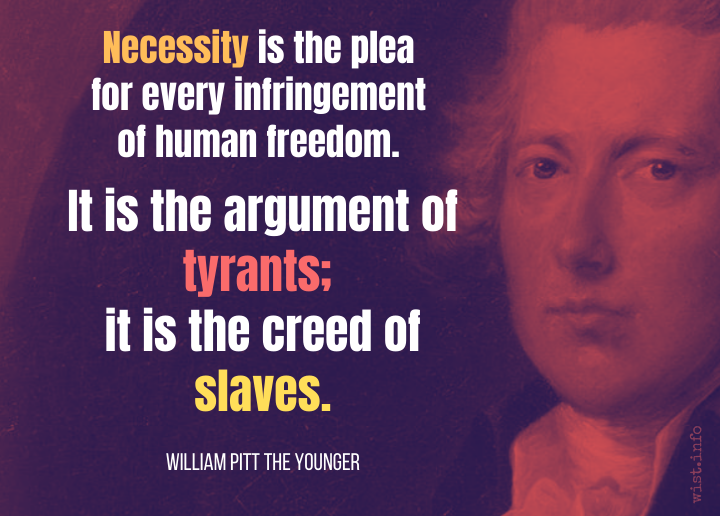Chance is necessity hidden behind a veil.
[Zufall ist die in Schleier gehüllte Nothwendigkeit.]
Marie von Ebner-Eschenbach (1830-1916) Austrian writer
Aphorisms [Aphorismen], No. 10 (1880) [tr. Scrase/Mieder (1994)]
(Source)
Quotations about:
necessity
Note not all quotations have been tagged, so Search may find additional quotes on this topic.
He that is rich need not live sparingly, and he that can live sparingly need not be rich.
Benjamin Franklin (1706-1790) American statesman, scientist, philosopher, aphorist
Poor Richard (1734 ed.)
(Source)
Art followed hard on art. Toil triumphed over every obstacle, unrelenting Toil, and Want that pinches when life is hard.
[Tum variae venere artes. Labor omnia vicit
inprobus et duris urgens in rebus egestas.]Virgil (70-19 BC) Roman poet [b. Publius Vergilius Maro; also Vergil]
Georgics [Georgica], Book 1, l. 145ff (1.145) (29 BC) [tr. Fairclough (Loeb) (1916)]
(Source)
On humanity developing the arts and sciences in response to Jove making life difficult.
Compare this to Labor omnia vincit ("Work conquers all"), Oklahoma's state motto.
(Source (Latin)). Alternate translations:
Then came strange arts, fierce labor all subdues.
Inforc'd by bold Necessity, and Want.
[tr. Ogilby (1649)]
And various Arts in order did succeed,
(What cannot endless Labour urg'd by need?)
[tr. Dryden (1709), ll. 217-218]
Thus by long labour arts to arts succeed,
Such is the force of all-compelling need.
[tr. Nevile (1767)]
Thus rous'd by varied wants new arts arose,
And strenuous Labour triumph'd at its close.
[tr. Sotheby (1800)]
Then various arts ensued. Incessant labour and want, in hardships pressing, surmounted every obstacle.
[tr. Davidson (1854)]
Then came the various arts: oh, grand success
Of reckless toil and resolute distress!
[tr. Blackmore (1871)]
Then came the various arts of life. So toil, relentless toil, and the pressure of want in adversity, conquered the world. [tr. Wilkins (1873)]
Then divers arts arose; toil conquered all,
Remorseless toil, and poverty's shrewd push
In times of hardship.
[tr. Rhoades (1881)]
Thus stern Necessity inventive tried
Fresh arts, which life’s increasing wants supplied.
[tr. King (1882)]
Then various arts followed. Unwearying labor overcame every difficulty, and want spurring men on in times of hardship.
[tr. Bryce (1897)]
Then arts many in sort; nothing but yielded to unrelenting toil and the hard pressure of poverty.
[tr. Mackail (1899)]
Then divers arts arose; toil conquered all,
Remorseless toil, and poverty's shrewd push
In times of hardship.
[tr. Greenough (1900)]
Then followed manifold arts: unflinching toil ever one
Triumphs: in hardship's school stern need still drave men on.
[tr. Way (1912)]
Then later times
Brought forth of other arts the varied skill.
Work conquered all, relentless, obstinate,
While poverty and hardship urged it on.
[tr. Williams (1915)]
Then numerous arts arose. Yes, unremitting labour
And harsh necessity's hand will master anything.
[tr. Day-Lewis (1940)]
Then followed all the civilizing arts:
Hard labor conquered all, and pinching need.
[tr. Bovie (1956)]
Then all kinds of skills came into being. Toil has overcome all things, runious toil and need, pressing in harsh circumstances.
[tr. Miles (1980)]
And last the various arts.
Toil mastered everything, relentless toil
And the pressure of pinching poverty.
[tr. Wilkinson (1982)]
Then came the various arts. Hard labour conquered all,
and poverty’s oppression in harsh times.
[tr. Kline (2001)] https://www.poetryintranslation.com/PITBR/Latin/VirgilGeorgicsI.php#anchor_Toc533589845:~:text=then%20came%20the,in%20harsh%20times.
Then came the arts in many guises. Relentless work conquered
all difficulties -- work and urgent need when times were hard.
[tr. Lembke (2004)]
All this before the knowledge and know-how which ensued. Hard work prevailed, hard work and pressing poverty.
[tr. Fallon (2006)]
And then myriad arts. Toil subdued the earth, relentless toil, and the prick of dearth in hardship.
[tr. Johnson (2009)]
Then followed other arts; and everything
Was toil, relentless toil, urged on by need.
[tr. Ferry (2015)]
Necessity brings him here, not pleasure.
[Necessità ‘l ci ‘nduce, e non diletto.]
Dante Alighieri (1265-1321) Italian poet
The Divine Comedy [Divina Commedia], Book 1 “Inferno,” Canto 12, l. 87 (12.87) [Virgil] (1309) [tr. Sinclair (1939)]
(Source)
Explaining why a living mortal is wandering around Hell. (Source (Italian)). Alternate translations:
Necessity, not Choice, has brought him here.
[tr. Rogers (1782)]
'Twas fate compell'd him, no profane delight.
[tr. Boyd (1802), st. 13]
Thereto induc’d
By strict necessity, not by delight.
[tr. Cary (1814)]
Nor pleasure draws us, but necessity.
[tr. Dayman (1843)]
Necessity brings him to it, and not sport.
[tr. Carlyle (1849)]
Necessity the cause, and not delight.
[tr. Bannerman (1850)]
Necessity compels him, not delight.
[tr. Johnston (1867)]
Necessity, and not delight, impels us.
[tr. Longfellow (1867)]
Necessity leads us on, and not enjoyment.
[tr. Butler (1885)]
Necessity compels us, not delight.
[tr. Minchin (1885)]
Necessity brings him hither and not delight.
[tr. Norton (1892)]
Necessity, not pastime, bringeth him to it.
[tr. Sullivan (1893)]
Necessity doth bring him here, not pastime.
[tr. Griffith (1908)]
Necessity brings him to it, and not whim.
[tr. Binyon (1943)]
Necessity brings him here, not sport nor jest.
[tr. Sayers (1949)]
Fate brings him here, not curiosity.
[tr. Ciardi (1954)]
Necessity brings him to it, and not sport.
[tr. Singleton (1970)]
He travels by necessity, not pleasure.
[tr. Musa (1971)]
Necessity has brought him here, not not pleasure.
[tr. Mandelbaum (1980)]
It is because he must come, not for amusement.
[tr. Sisson (1981)]
It is necessity,
And not pleasure, that puts him on this road.
[tr. Pinsky (1994), ll. 80-81]
Necessity induces us, and not pleasure.
[tr. Durling (1996)]
Necessity brings him here, and not desire.
[tr. Kline (2002)]
Necessity, not pleasure, leads us on.
[tr. Kirkpatrick (2006)]
Necessity compels us, not delight.
[tr. Hollander/Hollander (2007)]
He is brought
Here by necessity, not pleasure.
[tr. James (2013)]
Tolerance, I believe, will be imperative after the establishment of peace. It’s always useful to take a concrete instance: and I have been asking myself how I should behave if, after peace was signed, I met Germans who had been fighting against us. I shouldn’t try to love them: I shouldn’t feel inclined. They have broken a window in my little ugly flat for one thing, and they have done other things which I need not specify. But I shall try to tolerate them, because it is common-sense, because in the post-war world we shall have to live with Germans […] not for any lofty reason, but because it is the next thing that will have to be done.
E. M. Forster (1879-1970) English novelist, essayist, critic, librettist [Edward Morgan Forster]
“The Unsung Virtue of Tolerance,” radio broadcast, BBC (Jul 1941)
(Source)
Published as "Tolerance," Two Cheers for Democracy (1951).
Next would seem properly to follow a dissertation on Friendship: because, in the first place, it is either itself a virtue or connected with virtue; and next it is a thing most necessary for life, since no one would choose to live without friends though he should have all the other good things in the world.
[μετὰ δὲ ταῦτα περὶ φιλίας ἕποιτ᾽ ἂν διελθεῖν: ἔστι γὰρ ἀρετή τις ἢ μετ᾽ ἀρετῆς, ἔτι δ᾽ ἀναγκαιότατον εἰς τὸν βίον. ἄνευ γὰρ φίλων οὐδεὶς ἕλοιτ᾽ ἂν ζῆν, ἔχων τὰ λοιπὰ ἀγαθὰ πάντα.]
Aristotle (384-322 BC) Greek philosopher
Nicomachean Ethics [Ἠθικὰ Νικομάχεια], Book 8, ch. 1 (8.1, 1155a.3) (c. 325 BC) [tr. Chase (1847)]
(Source)
Rackham notes:
φιλία, ‘friendship,’ sometimes rises to the meaning of affection or love, but also includes any sort of kindly feeling, even that existing between business associates, or fellow-citizens. The corresponding verb means both ‘to like’ and ‘to love’; the adjective is generally passive, ‘loved,’ ‘liked,’ ‘dear,’ but sometimes active ‘loving,’ ‘liking,’ and so on, as a noun ‘a friend.’
Weldon notes:
If it were necessary to choose one word for φιλία the best would be "friendship," but it corresponds as substantive to the meanings of the verb φιλείν and therefore rises at times in point of intensity to "love."
(Source (Greek)). Alternate translations:
Next in order it follows that we ought to treat of friendship. For friendship, if not itself a virtue, at least involves and implies virtue; and it is, moreover, an absolute essential for a happy life, since without friends no man would choose to live, although possessed of every other good thing.
[tr. Williams (1869)]
It will be natural to discuss friendship or love next, for friendship is a kind of virtue or implies virtue. It is also indispensable to life. For nobody would choose to live without friends, although he were in possession of every other good.
[tr. Welldon (1892)]
After the foregoing, a discussion of friendship will naturally follow, as it is a sort of virtue, or at least implies virtue, and is, moreover, most necessary to our life. For no one would care to live without friends, though he had all other good things.
[tr. Peters (1893)]
After what we have said, a discussion of friendship would naturally follow, since it is a virtue or implies virtue, and is besides most necessary with a view to living. For without friends no one would choose to live, though he had all other goods.
[tr. Ross (1908)]
Our next business after this will be to discuss Friendship. For friendship is a virtue, or involves virtue; and also it is one of the most indispensable requirements of life. For no one would choose to live without friends, but possessing all other good things.
[tr. Rackham (1934)]
The next topic we should discuss is friendship, since friendship is a sort of virtue or involves virtue. Furthermore, it is most necessary as regards living. For no one would choose to live without friends, even if he had all the other good things.
[tr. Reeve (1948)]
After what has just been said, a discussion of friendship would follow, for friendship is a virtue or something with virtue, and besides it is most necessary to life, for no one would choose to live without friends, though he were to have all the other goods.
[tr. Apostle (1975)]
After this the next step will be to discuss friendship; for it is a kind of virtue, or implies virtue, and it is also most necessary as for living. Nobody would choose to live without friends, even if he had all the other good things.
[tr. Thomson/Tredennick (1976)]
After this, the next step would be a discussion of friendship, since it is a virtue or involves virtue, and is an absolute necessity in life. No one would choose to live without friends, even if he had all the other goods.
[tr. Crisp (2000)]
It would follow, after these matters, to go through what concerns friendship. For friendship is a certain virtue or is accompanied by virtue; and, further, it is most necessary with a view to life: without friends, no one would choose to live, even if he possessed all other goods.
[tr. Bartlett/Collins (2011)]
Sex is interesting, but it’s not totally important. I mean, it’s not even as important (physically) as excretion. A man can go seventy years without a piece of ass, but he can die in a week without a bowel movement.
Evil when we are in its power is not felt as evil but as a necessity, or even a duty.
A little government and a little luck are necessary in life, but only a fool trusts either of them.
My definition of art is anything you do after the chores are done, and in that definition of art, Ron Jeremy, Picasso, and the mall Santa all have the exact same job.
Penn Jillette (b. 1955) American stage magician, actor, musician, author
Interview by Katherine Mangu-Ward, Reason (Jan 2017)
(Source)
For the moral point of this matter is never reached by calling what happened by the name of “genocide” or by counting the many millions of victims: the extermination of whole peoples had happened before in antiquity, as well as in modern colonization. It is reached only when we realize that this happened within the frame of a legal order and that the cornerstone of this “new law” consisted of the command “Thou shalt kill,” not thy enemy but innocent people who were not even potentially dangerous, and not for any reason of necessity but, on the contrary, even against all military and other utilitarian considerations.
Hannah Arendt (1906-1975) German-American philosopher, political theorist
“Personal Responsibility Under Dictatorship” (1964)
(Source)
Necessity is the only successful adviser.
Charles Reade (1814-1884) English novelist and dramatist
(Attributed)
(Source)
In M. Ballou, Edge-Tools of Speech (1886).
That the beauty of life is a thing of no moment, I suppose few people would venture to assert, and yet most civilized people act as if it were of none, and in so doing are wronging themselves and those that are to come after them; for that beauty, which is what is meant by art, using the word in its widest sense, is, I contend, no mere accident to human life, which people can take or leave as they choose, but a positive necessity of life, if we are to live as nature meant us to; that is, unless we are content to be less than men.
William Morris (1834-1896) British textile designer, writer, socialist activist
“The Beauty of Life,” lecture, Birmingham Society of Arts and School of Design (19 Feb 1880)
(Source)
The human animal needs a freedom seldom mentioned, freedom from intrusion. He needs a little privacy quite as much as he wants understanding or vitamins or exercise or praise.
In the affluent society no sharp distinction can be made between luxuries and necessaries.
John Kenneth Galbraith (1908-2006) Canadian-American economist, diplomat, author
The Affluent Society, ch. 21, sec. 4 (1998, 4th ed.)
(Source)
On sales taxes. Sometimes quoted (from other editions?) as "useful distinction."
I was often humiliated to see men disputing for a piece of bread, just as animals might have done. My feelings on this subject have very much altered since I have been personally exposed to the tortures of hunger. I have discovered, in fact, that a man, whatever may have been his origin, his education, and his habits, is governed, under certain circumstances, much more by his stomach than by his intelligence and his heart.
François Arago (1786-1853) French Catalan mathematician, physicist, astronomer, politician
Biographies of Distinguished Scientific Men, “The History of My Youth” (1859) [tr. Smyth, Powell, Grant]
(Source)
Reason allows us to determine when our wishes are in irrevocable conflict with reality, and then bids us to submit ourselves willingly, rather than angrily or bitterly, to necessities. We may be powerless to alter certain events, but we remain free to choose our attitude towards them, and it is in our spontaneous acceptance of necessity that we find our distinctive freedom.
Alain de Botton (b. 1969) Swiss-British author
The Consolations of Philosophy, ch. 3 “Consolation for Frustration”(2000)
(Source)
While we are poor, the necessarys ov life are the luxurys; after we git ritch, the luxurys are the necessarys.
[While we are poor, the necessaries of life are the luxuries; after we get rich, the luxuries are the necessaries.]
Josh Billings (1818-1885) American humorist, aphorist [pseud. of Henry Wheeler Shaw]
Everybody’s Friend, Or; Josh Billing’s Encyclopedia and Proverbial Philosophy of Wit and Humor, “Mollassis Kandy” (1874)
(Source)
We do what we must, and call it by the best names we can, and would fain have the praise of having intended the result which ensues.
Ralph Waldo Emerson (1803-1882) American essayist, lecturer, poet
“Experience,” Essays: Second Series (1844)
(Source)
The essence of good manners consists in making it clear that one has no wish to hurt. When it is clearly necessary to hurt, it must be done in such a way as to make it evident that the necessity is felt to be regrettable.
Bertrand Russell (1872-1970) English mathematician and philosopher
“Good Manners and Hypocrisy,” New York American (1934-12-14)
(Source)
Before all masters, necessity is the one most listened to, and who teaches the best.
[La nécessité est, d’ailleurs, de tous les maîtres, celui qu’on écoute le plus et qui enseigne le mieux.]
Jules Verne (1828-1905) French novelist, poet, playwright
The Mysterious Island, Part 1, ch. 17 (1874)
(Source)
These are times in which a genius would wish to live. It is not in the still calm of life, or in the repose of a pacific station, that great characters are formed. The habits of a vigorous mind are formed in contending with difficulties. Great necessities call out great virtues.
Your spirit, youth, and valour give me heart, not to mention necessity, which makes even the timid brave.
[Animus, aetas, virtus vostra me hortantur, praeterea necessitudo, que etiam timidos fortis facit.]
Sallust (c. 86-35 BC) Roman historian and politician [Gaius Sallustius Crispus]
Bellum Catilinae [The War of Catiline; The Conspiracy of Catiline], ch. 58, sent. 19 [tr. Rolfe (1931)]
(Source)
Catiline, addressing his troops. Usually shortened to "Necessity makes even the timid brave" [Necessitas etiam timidos fortes facit.]. Original Latin.
Alt. trans.:
- "From your youthful vigor and undaunted courage I expect every advantage. Even the difficulties of our situation inspire me with confidence; for difficulties have often produced prodigies of valor." [tr. Murphy (1807)]
- "Your spirit, your age, your virtue encourage me; and our necessity, too, which even inspires cowards with bravery." [tr. Rose (1831), ch. 61]
- "Your spirit, your age, your valour encourage me, the necessity moreover which makes even the timid brave." [Source (1841)]
- "Your spirit, your age, your valor, give me confidence; to say nothing of necessity, which makes even cowards brave." [tr. Watson (1867)]
- "Your resolution, your age, and your courage, and above all the inevitable nature of the encounter, which often makes even the timid brave, exhort me to this." [tr. Pollard (1882)]
Necessity can make a doubtful action innocent, but it cannot make it commendable.
[La nécessité peut rendre innocente une action douteuse ; mais elle ne saurait la rendre louable.]
Joseph Joubert (1754-1824) French moralist, philosopher, essayist, poet
Pensées [Thoughts], ch. 9 “De la Sagesse, de la Vertu, etc. [On Wisdom and Virtue],” ¶ 20 (1850 ed.) [tr. Auster (1983), 1808]
(Source)
(Source (French)). Alternate translations:
Necessity may render a doubtful act innocent, but it cannot make it praiseworthy.
[tr. Attwell (1896), ¶ 133]
Necessity may render a doubtful action innocent; but it cannot make it praiseworthy.
[tr. Lyttelton (1899), ch. 8, ¶ 16]
The lack of objectivity, as far as foreign nations are concerned, is notorious. From one day to another, another nation is made out to be utterly depraved and fiendish, while one’s own nation stands for everything that is good and noble. Every action of the enemy is judged by one standard — every action of oneself by another. Even good deeds by the enemy are considered a sign of particular devilishness, meant to deceive us and the world, while our bad deeds are necessary and justified by our noble goals, which they serve.
Erich Fromm (1900-1980) American psychoanalyst and social philosopher
The Art of Loving, ch. 5 (1956)
(Source)
“The counsel of Gandalf was not founded on foreknowledge of safety, for himself or for others,” said Aragorn. “There are some things that it is better to begin than to refuse, even though the end may be dark.”
J.R.R. Tolkien (1892-1973) English writer, fabulist, philologist, academic [John Ronald Reuel Tolkien]
The Lord of the Rings, Vol. 2: The Two Towers, Book 3, ch. 2 “The Riders of Rohan” (1954)
(Source)
Love and compassion are necessities, not luxuries. Without them, humanity cannot survive. With them, we can make a joint effort to solve the problems of the whole humankind.
Society in every state is a blessing, but Government, even in its best state, is but a necessary evil; in its worst state an intolerable one: for when we suffer, or are exposed to the same miseries by a Government, which we might expect in a country without Government, our calamity is heightened by reflecting that we furnish the means by which we suffer.
Thomas Paine (1737-1809) American political philosopher and writer
Common Sense, “On the Origin and Design of Government in General” (14 Feb 1776)
(Source)
Manhood begins when we have in any way made truce with Necessity; begins even when we have surrendered to Necessity, as the most part only do; but begins joyfully and hopefully only when we have reconciled ourselves to Necessity; and thus, in reality, triumphed over it, and felt that in Necessity we are free.
Thomas Carlyle (1795-1881) Scottish essayist and historian
“Burns,” Edinburgh Review No. 96, Art. 1 (1828-12)
(Source)
A review of Lockhart, The Life of Robert Burns (1828).
I am here to represent humanity: it is by no means necessary that I should live, but it is by all means necessary that I should act rightly.
Incorporated into “Essential Principles of Religion,” Lecture, Congregational Society, Boston (16 Mar 1862).
A room without books is like a body without a soul.
Marcus Tullius Cicero (106-43 BC) Roman orator, statesman, philosopher
(Paraphrase)
(Source)
This appears to be a paraphrase of:
Since Tyrannio has arranged my books, the house seems to have acquired a soul.
[Postea vero quam Tyrannio mini libros disposuit, mens addita videtur meis aedibus.]
From Epistulae ad Atticum [Letters to Atticus], Book 4, Letter 8 (4.8) (Apr-May 56 BC) [tr. Winstedt (1912)].
A strict observance of the written laws is doubtless one of the high duties of a good citizen: but it is not the highest. The laws of necessity, of self-preservation, of saving our country when in danger, are of higher obligation. To lose our country by a scrupulous adherence to written law, would be to lose the law itself, with life, liberty, property & all those who are enjoying them with us; thus absurdly sacrificing the end to the means.
Thomas Jefferson (1743-1826) American political philosopher, polymath, statesman, US President (1801-09)
Letter to John B. Colvin (20 Sep 1810)
(Source)
It is true, the bill is said to be founded on necessity; but what is this? Is it not necessity, which has always been the plea of every illegal exertion of power, or exercise of oppression? Is not necessity the pretence of every usurpation? Necessity is the plea for every infringement of human freedom. It is the argument of tyrants; it is the creed of slaves.
HENRY: Are these things then necessities?
Then let us meet them like necessities.William Shakespeare (1564-1616) English dramatist and poet
Henry IV, Part 2, Act 3, sc. 1, l. 94ff (3.1.94-95) (c. 1598)
(Source)












